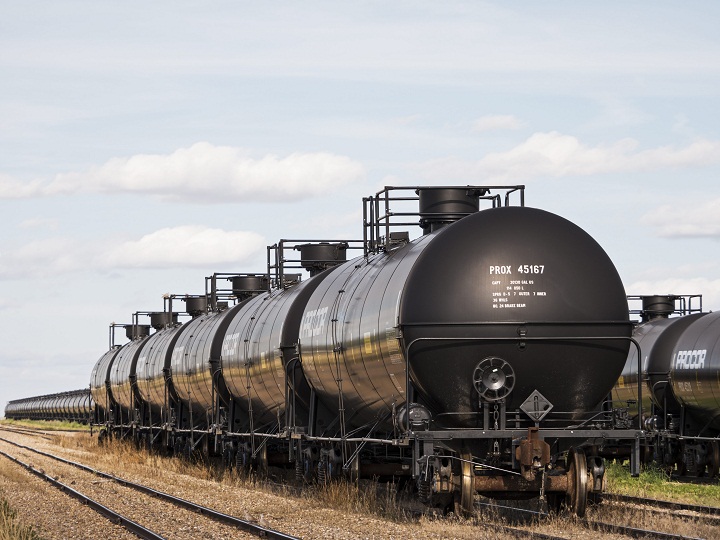Months after hitting record highs, the amount of Canadian oil being shipped by rail has fallen by more than 50 per cent as major oil companies, like Suncor and Imperial, put the brakes on their oil-by-rail operations.

“The incentive to move crude rail has been erased; it is negative,” Imperial CEO Rich Kruger told analysts earlier this month.
In his fourth-quarter update to analysts last week, Suncor CEO Steve Williams said much the same.
“The rail economics are seriously damaged. A lot of the rail movements are stopping or have stopped.”
READ MORE: Alberta orders 8.7 per cent oil production cut to help deal with low prices
According to the National Energy Board, 330,402 barrels per day of Canadian crude oil was shipped by rail during the month of November 2018. According to Kruger, almost half of that volume was being shipped by Imperial.
“In November we were at 153 (thousand barrels per day) and in December were at 168,” Kruger said during a webcast on February 1.
By January, Kruger says, that volume began to drop significantly.
“I think our average will have been about 90,000 barrels a day, half of what we had targeted and in February, with current condition as they are, we expect to be at or near zero.”
Both Imperial and Suncor blame the Alberta government’s mandatory production cut for the decrease. Back in December, the province announced that as of January, there would be an 8.7 per cent reduction ordered in oil production. The move was designed to drive up the price of Alberta oil by reducing the massive amount of product that had accumulated in storage. Weeks later, Alberta oil is getting that better price but transportation costs have risen as well.
“The railroads are more costly than pipelines,” said Kevin Birn, North American crude oil market analyst with IHS Markit.
“You need the price difference (between Western Canadian Select’s discount to the U.S. benchmark) to be big enough to cover that cost.”
READ MORE: Alberta eases oil production cap by 75K barrels per day
The Alberta government has responded by easing the production limits. In an interview with Global News, Premier Rachel Notley said the government’s goal is to move away from curtailment as quickly as the market allows.
“As we get to the point of being able to increase that takeaway capacity, we’ll be able to further reduce curtailment and as that happens, the differential will open up a bit and rail economics will reappear.”
Still, Kruger says ramping up oil transport again won’t happen overnight. Even when the differential improves, he says it could take months for Imperial to get its rail operations going again.
During its fourth quarter call with analysts, Cenovus Energy CEO Alex Pourbaix says the company plans to ramp up its oil-by-rail operations from 20,000 barrels a day right now to 100, 000 barrels a day by the end of the year. But most of that increase won’t happen for several months.
The Alberta government is also planning to start moving oil by rail. Details of the province’s plan to purchase 7,000 rail cars in order to move 120,000 barrels a day are expected to be released next week. Those cars won’t start moving product until the end of 2019.


Comments